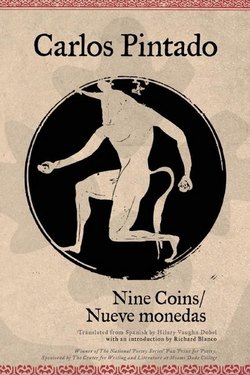Читать книгу Nine Coins/Nueve monedas - Carlos Pintado - Страница 5
На сайте Литреса книга снята с продажи.
ОглавлениеIntroducción
por Richard Blanco
Como ocurre en la gran poesía, los poemas que componen la colección Nine Coins/Nueve monedas de Carlos Pintado examinan las complejidades, contradicciones, y yuxtaposiciones más profundas de la condición humana. Debido a esto, su obra motiva nuestros conceptos del amor, la mortalidad, el arte, la literatura, la historia—preceptos propios del ser.
La urgencia de sus poemas nos hacen sentir como si la propia vida del poeta dependiera de su escritura. Están poseídos por una cualidad original e intangible que capta la atención del lector con un lenguaje dominante. La voz de estos poemas, como si se tratase de un oráculo, aflora mediante expresiones semejantes a aforismos de verdad, principios, y astuta observación, con frecuencia en términos más lacónicos, como en “El espejo”:
Un espejo cambiante es toda vida,
un espejo que a ciegas lanza un lento
reflejo de reflejos, un momento
que luego se repite y ya se olvida.
Aun así, esa sabiduría poética tiene como contrapunto una presencia genuina y honesta. Los poemas de Pintado, independientemente de que capten escenas callejeras cotidianas, hablen de los antiguos, sobrecojan por la maravilla natural, o se inspiren en las obras de los grandes escritores, están estructurados no como expresiones académicas, sino como expresiones íntimas; están enraizados e informados de experiencias honestas de deseo y pérdida, memoria y mortalidad, éxtasis y terror, como se evidencia en “Postal para Elizabeth Bishop”:
La noche ha hecho en mí su casa.
He soñado mi cuerpo como una sombra entrando
en otra sombra, cuerpo de mí o de la noche,
como un fuego en tinieblas despacio devorándome.
Pintado, que nos guía hacia los mundos míticos y místicos de su imaginación íntima, me recuerda mucho a Borges. Somos testigos de una especie de transubstanciación en la medida que el poeta se transforma en el poema en sí. Hemos dejado de “leer” para experimentar su /nuestro propio ser. Las palabras ya no lo son, pero nos hablan como un alma nos hablaría—no a través del mero lenguaje, pero a través del sentimiento puro, y la evocación:
A mitad del poema, algo sagrado
nos empuja a seguir por los distantes
abismos que abre el sueño en lo soñado.
de “A mitad del poema”
Yo esperaba al ángel de ojos afilados.
Yo esperaba al ángel.
Y las ventanas se abrieron a la noche,
y yo no fui más.
de “Paisaje con sombra y casa que da a la noche”
Richard Blanco es el quinto poeta que participa en una toma de posesión presidencial, así como el más joven, el primer hispano, inmigrante, y gay en la historia de los Estados Unidos. Nació en Madrid de padres cubanos exiliados, y se crió en Miami. Es autor de varios libros de memorias aclamados, libros de versos premiados, y antologías.
Translated from English by Jesús Vega
Introduction
by Richard Blanco
The poems of Carlos Pintado’s collection Nine Coins/Nueve monedas, like all great poetry, examine the deepest complexities, contradictions, and juxtapositions of the human condition. As such, his work provokes our notions of love, mortality, art, literature, history—the very precepts of being.
The urgency in these poems feels as if the poet’s very life depended on writing them. They are possessed by a unique, intangible quality that arrests the reader’s attention with commanding language. As an oracle might speak, the voice of these poems comes through in aphorism-like expressions of truth, principle, and astute observation, often in the most laconic of terms, as he writes in “The Mirror”:
All life is but a mirror, one that shifts
and blindly casts a slow reflection
of reflections, a moment that repeats itself
before it is forgotten.
Yet, such poetic wisdom is counterpointed by a genuine, honest presence. Whether capturing an everyday street scene, speaking about the ancients, awed by natural wonder, or inspired by great authors’ works, Pintado’s poems are framed not as academic expressions, but as intimate expressions; they are grounded and informed by honest experiences of desire and loss, memory and mortality, rapture and terror, as is evident in “Postcard to Elizabeth Bishop”:
The night has made its home in me.
I’ve dreamed my body like a shadow entering
another shadow, my body or else the night’s,
devouring me slowly like a fire in the dark.
Leading us into the mythic and mystical worlds of his intimate imagination, Pintado reminds me very much of Borges. We witness a kind of transubstantiation as the poet himself becomes the poem itself. We are no longer “reading” but experiencing his/our very being. Words are no longer words, but speak to us the way a soul would speak to us—not through mere language, but through pure feeling, and evocation:
Halfway through the poem, it seems something sacred
will force us to follow it down distant depths
where it opens the dreaming into what is dreamed.
from “Halfway Through the Poem”
I was waiting for an angel with keen eyes.
I was waiting for an angel.
And the windows opened to the night,
and I was no more.
from “Landscape with Shadow and House Overlooking the Night”
Richard Blanco is the fifth presidential inaugural poet in US history—the youngest, first Latino, immigrant, and gay person to serve in such a role. Born in Madrid to Cuban-exiled parents and raised in Miami, he is the author of several acclaimed memoirs, award-winning poetry collections, and chapbooks.
